Comprehensive Analysis: Factors for Expatriate Project Success
VerifiedAdded on 2020/07/22
|10
|2946
|70
Report
AI Summary
This report examines the critical factors influencing the success of expatriate projects in multinational companies. It highlights the importance of cultural sensitivity, adventurousness, flexibility, and open-mindedness in adapting to new environments. The report also discusses personal attributes, such as selection criteria, training, and role clarity, as well as the significance of family-related factors. It provides specific examples, such as Walmart's expansion, and offers practical tips for organizations to increase their return on investment in overseas assignments, including the importance of a compelling purpose, frequent communication, strong support, reintegration planning, and knowledge sharing. The report emphasizes the need for organizations to proactively manage and support expatriates to ensure successful project outcomes and sustainable business growth in the global market.
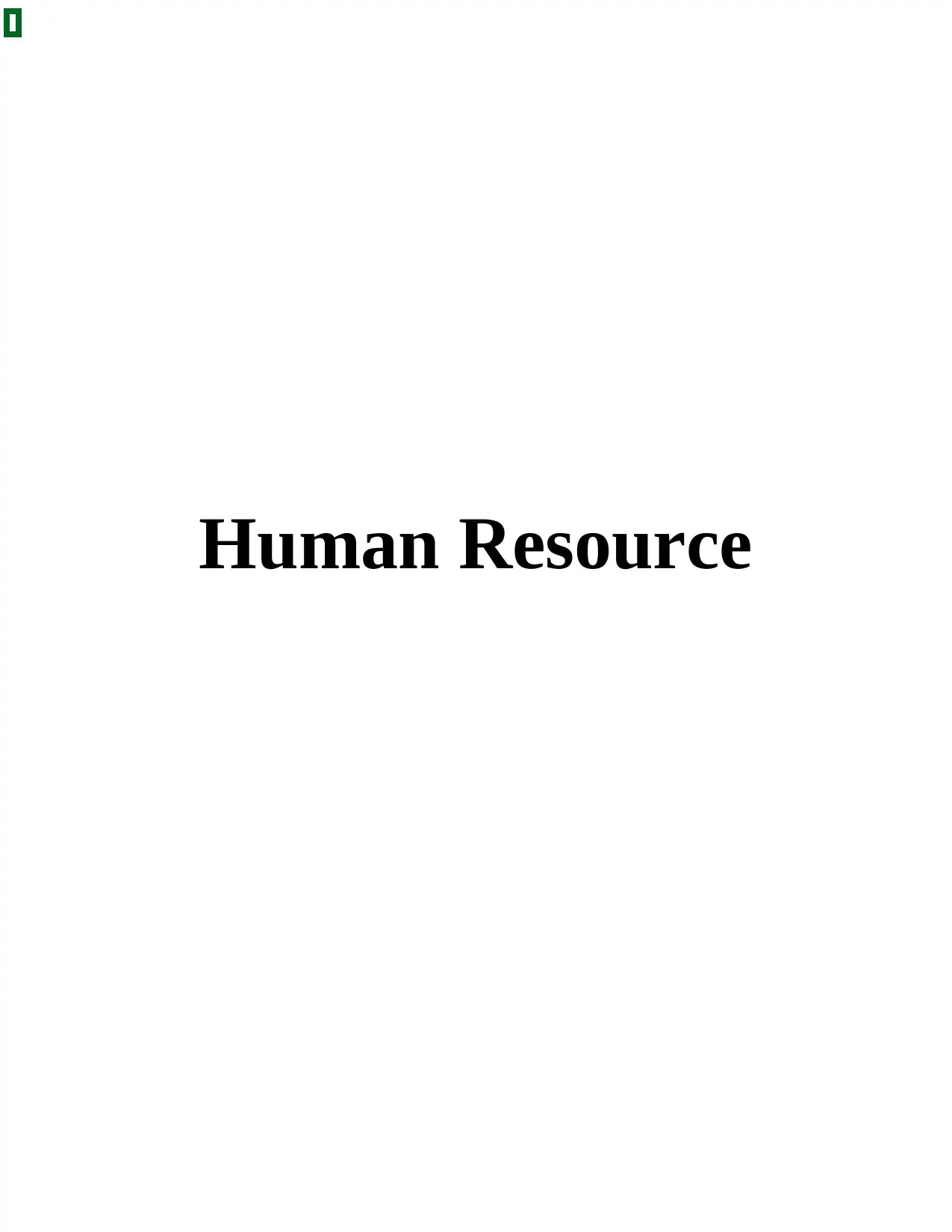
Human Resource
Paraphrase This Document
Need a fresh take? Get an instant paraphrase of this document with our AI Paraphraser

Table of Contents
INTRODUCTION...........................................................................................................................1
TASK...............................................................................................................................................1
CONCLUSION................................................................................................................................6
REFERENCES................................................................................................................................7
INTRODUCTION...........................................................................................................................1
TASK...............................................................................................................................................1
CONCLUSION................................................................................................................................6
REFERENCES................................................................................................................................7
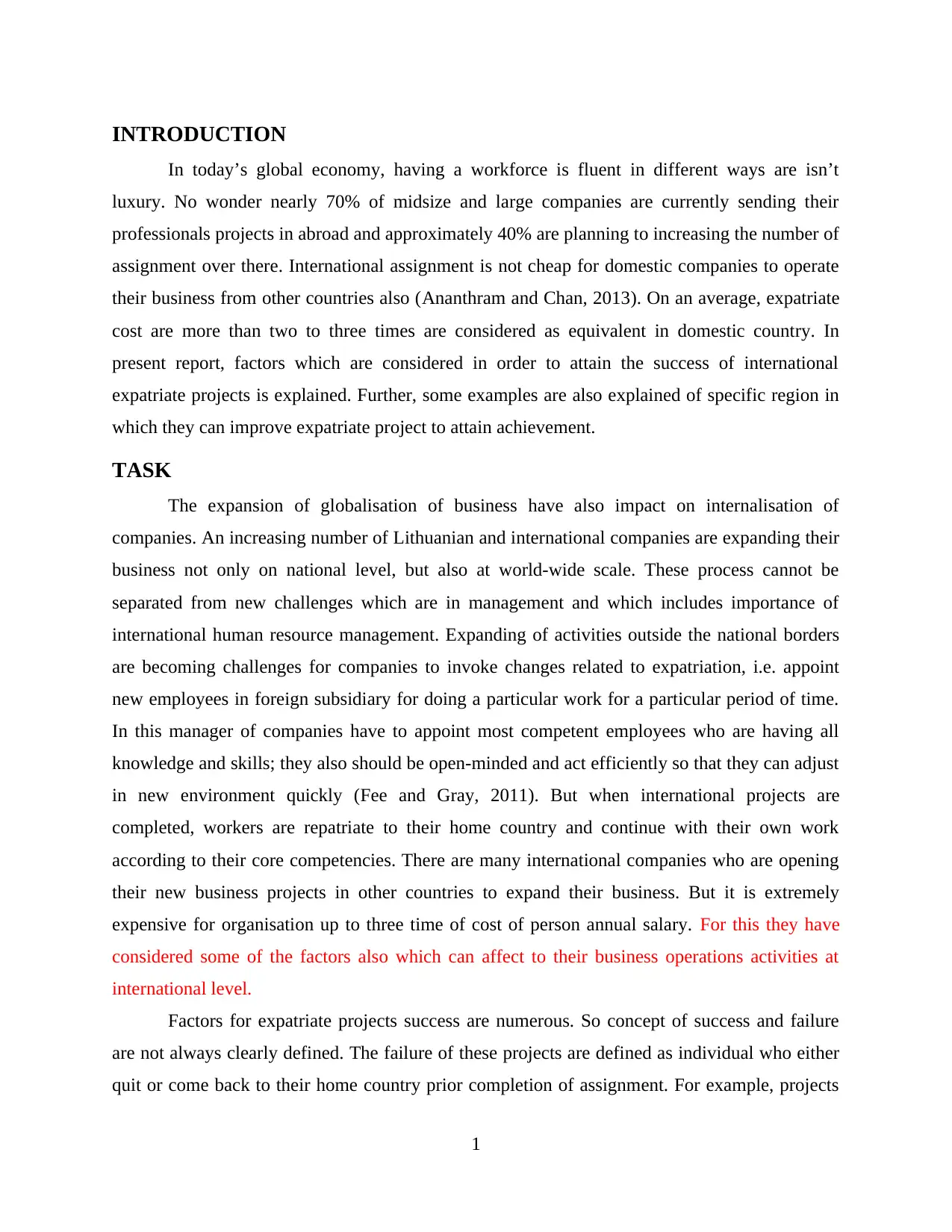
INTRODUCTION
In today’s global economy, having a workforce is fluent in different ways are isn’t
luxury. No wonder nearly 70% of midsize and large companies are currently sending their
professionals projects in abroad and approximately 40% are planning to increasing the number of
assignment over there. International assignment is not cheap for domestic companies to operate
their business from other countries also (Ananthram and Chan, 2013). On an average, expatriate
cost are more than two to three times are considered as equivalent in domestic country. In
present report, factors which are considered in order to attain the success of international
expatriate projects is explained. Further, some examples are also explained of specific region in
which they can improve expatriate project to attain achievement.
TASK
The expansion of globalisation of business have also impact on internalisation of
companies. An increasing number of Lithuanian and international companies are expanding their
business not only on national level, but also at world-wide scale. These process cannot be
separated from new challenges which are in management and which includes importance of
international human resource management. Expanding of activities outside the national borders
are becoming challenges for companies to invoke changes related to expatriation, i.e. appoint
new employees in foreign subsidiary for doing a particular work for a particular period of time.
In this manager of companies have to appoint most competent employees who are having all
knowledge and skills; they also should be open-minded and act efficiently so that they can adjust
in new environment quickly (Fee and Gray, 2011). But when international projects are
completed, workers are repatriate to their home country and continue with their own work
according to their core competencies. There are many international companies who are opening
their new business projects in other countries to expand their business. But it is extremely
expensive for organisation up to three time of cost of person annual salary. For this they have
considered some of the factors also which can affect to their business operations activities at
international level.
Factors for expatriate projects success are numerous. So concept of success and failure
are not always clearly defined. The failure of these projects are defined as individual who either
quit or come back to their home country prior completion of assignment. For example, projects
1
In today’s global economy, having a workforce is fluent in different ways are isn’t
luxury. No wonder nearly 70% of midsize and large companies are currently sending their
professionals projects in abroad and approximately 40% are planning to increasing the number of
assignment over there. International assignment is not cheap for domestic companies to operate
their business from other countries also (Ananthram and Chan, 2013). On an average, expatriate
cost are more than two to three times are considered as equivalent in domestic country. In
present report, factors which are considered in order to attain the success of international
expatriate projects is explained. Further, some examples are also explained of specific region in
which they can improve expatriate project to attain achievement.
TASK
The expansion of globalisation of business have also impact on internalisation of
companies. An increasing number of Lithuanian and international companies are expanding their
business not only on national level, but also at world-wide scale. These process cannot be
separated from new challenges which are in management and which includes importance of
international human resource management. Expanding of activities outside the national borders
are becoming challenges for companies to invoke changes related to expatriation, i.e. appoint
new employees in foreign subsidiary for doing a particular work for a particular period of time.
In this manager of companies have to appoint most competent employees who are having all
knowledge and skills; they also should be open-minded and act efficiently so that they can adjust
in new environment quickly (Fee and Gray, 2011). But when international projects are
completed, workers are repatriate to their home country and continue with their own work
according to their core competencies. There are many international companies who are opening
their new business projects in other countries to expand their business. But it is extremely
expensive for organisation up to three time of cost of person annual salary. For this they have
considered some of the factors also which can affect to their business operations activities at
international level.
Factors for expatriate projects success are numerous. So concept of success and failure
are not always clearly defined. The failure of these projects are defined as individual who either
quit or come back to their home country prior completion of assignment. For example, projects
1
⊘ This is a preview!⊘
Do you want full access?
Subscribe today to unlock all pages.

Trusted by 1+ million students worldwide
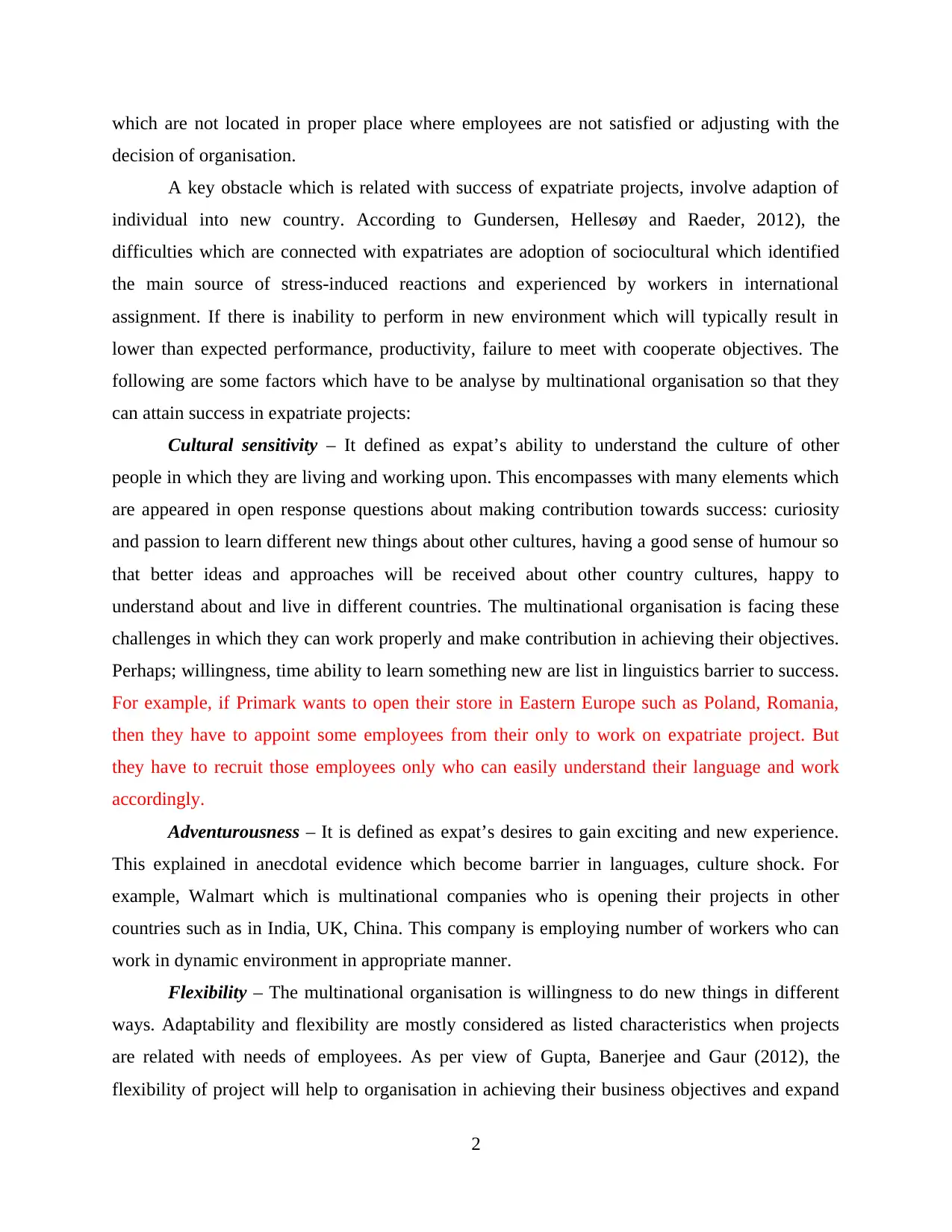
which are not located in proper place where employees are not satisfied or adjusting with the
decision of organisation.
A key obstacle which is related with success of expatriate projects, involve adaption of
individual into new country. According to Gundersen, Hellesøy and Raeder, 2012), the
difficulties which are connected with expatriates are adoption of sociocultural which identified
the main source of stress-induced reactions and experienced by workers in international
assignment. If there is inability to perform in new environment which will typically result in
lower than expected performance, productivity, failure to meet with cooperate objectives. The
following are some factors which have to be analyse by multinational organisation so that they
can attain success in expatriate projects:
Cultural sensitivity – It defined as expat’s ability to understand the culture of other
people in which they are living and working upon. This encompasses with many elements which
are appeared in open response questions about making contribution towards success: curiosity
and passion to learn different new things about other cultures, having a good sense of humour so
that better ideas and approaches will be received about other country cultures, happy to
understand about and live in different countries. The multinational organisation is facing these
challenges in which they can work properly and make contribution in achieving their objectives.
Perhaps; willingness, time ability to learn something new are list in linguistics barrier to success.
For example, if Primark wants to open their store in Eastern Europe such as Poland, Romania,
then they have to appoint some employees from their only to work on expatriate project. But
they have to recruit those employees only who can easily understand their language and work
accordingly.
Adventurousness – It is defined as expat’s desires to gain exciting and new experience.
This explained in anecdotal evidence which become barrier in languages, culture shock. For
example, Walmart which is multinational companies who is opening their projects in other
countries such as in India, UK, China. This company is employing number of workers who can
work in dynamic environment in appropriate manner.
Flexibility – The multinational organisation is willingness to do new things in different
ways. Adaptability and flexibility are mostly considered as listed characteristics when projects
are related with needs of employees. As per view of Gupta, Banerjee and Gaur (2012), the
flexibility of project will help to organisation in achieving their business objectives and expand
2
decision of organisation.
A key obstacle which is related with success of expatriate projects, involve adaption of
individual into new country. According to Gundersen, Hellesøy and Raeder, 2012), the
difficulties which are connected with expatriates are adoption of sociocultural which identified
the main source of stress-induced reactions and experienced by workers in international
assignment. If there is inability to perform in new environment which will typically result in
lower than expected performance, productivity, failure to meet with cooperate objectives. The
following are some factors which have to be analyse by multinational organisation so that they
can attain success in expatriate projects:
Cultural sensitivity – It defined as expat’s ability to understand the culture of other
people in which they are living and working upon. This encompasses with many elements which
are appeared in open response questions about making contribution towards success: curiosity
and passion to learn different new things about other cultures, having a good sense of humour so
that better ideas and approaches will be received about other country cultures, happy to
understand about and live in different countries. The multinational organisation is facing these
challenges in which they can work properly and make contribution in achieving their objectives.
Perhaps; willingness, time ability to learn something new are list in linguistics barrier to success.
For example, if Primark wants to open their store in Eastern Europe such as Poland, Romania,
then they have to appoint some employees from their only to work on expatriate project. But
they have to recruit those employees only who can easily understand their language and work
accordingly.
Adventurousness – It is defined as expat’s desires to gain exciting and new experience.
This explained in anecdotal evidence which become barrier in languages, culture shock. For
example, Walmart which is multinational companies who is opening their projects in other
countries such as in India, UK, China. This company is employing number of workers who can
work in dynamic environment in appropriate manner.
Flexibility – The multinational organisation is willingness to do new things in different
ways. Adaptability and flexibility are mostly considered as listed characteristics when projects
are related with needs of employees. As per view of Gupta, Banerjee and Gaur (2012), the
flexibility of project will help to organisation in achieving their business objectives and expand
2
Paraphrase This Document
Need a fresh take? Get an instant paraphrase of this document with our AI Paraphraser
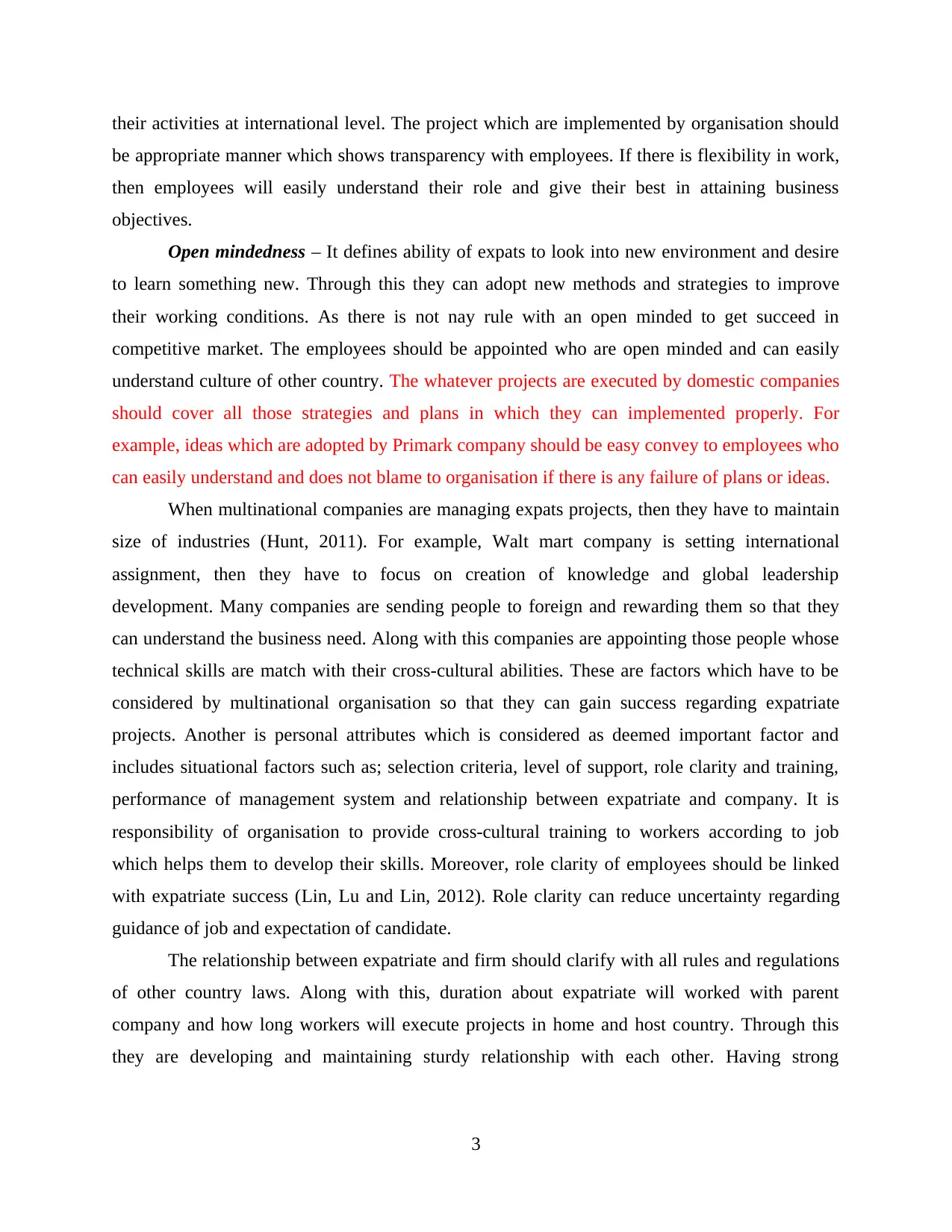
their activities at international level. The project which are implemented by organisation should
be appropriate manner which shows transparency with employees. If there is flexibility in work,
then employees will easily understand their role and give their best in attaining business
objectives.
Open mindedness – It defines ability of expats to look into new environment and desire
to learn something new. Through this they can adopt new methods and strategies to improve
their working conditions. As there is not nay rule with an open minded to get succeed in
competitive market. The employees should be appointed who are open minded and can easily
understand culture of other country. The whatever projects are executed by domestic companies
should cover all those strategies and plans in which they can implemented properly. For
example, ideas which are adopted by Primark company should be easy convey to employees who
can easily understand and does not blame to organisation if there is any failure of plans or ideas.
When multinational companies are managing expats projects, then they have to maintain
size of industries (Hunt, 2011). For example, Walt mart company is setting international
assignment, then they have to focus on creation of knowledge and global leadership
development. Many companies are sending people to foreign and rewarding them so that they
can understand the business need. Along with this companies are appointing those people whose
technical skills are match with their cross-cultural abilities. These are factors which have to be
considered by multinational organisation so that they can gain success regarding expatriate
projects. Another is personal attributes which is considered as deemed important factor and
includes situational factors such as; selection criteria, level of support, role clarity and training,
performance of management system and relationship between expatriate and company. It is
responsibility of organisation to provide cross-cultural training to workers according to job
which helps them to develop their skills. Moreover, role clarity of employees should be linked
with expatriate success (Lin, Lu and Lin, 2012). Role clarity can reduce uncertainty regarding
guidance of job and expectation of candidate.
The relationship between expatriate and firm should clarify with all rules and regulations
of other country laws. Along with this, duration about expatriate will worked with parent
company and how long workers will execute projects in home and host country. Through this
they are developing and maintaining sturdy relationship with each other. Having strong
3
be appropriate manner which shows transparency with employees. If there is flexibility in work,
then employees will easily understand their role and give their best in attaining business
objectives.
Open mindedness – It defines ability of expats to look into new environment and desire
to learn something new. Through this they can adopt new methods and strategies to improve
their working conditions. As there is not nay rule with an open minded to get succeed in
competitive market. The employees should be appointed who are open minded and can easily
understand culture of other country. The whatever projects are executed by domestic companies
should cover all those strategies and plans in which they can implemented properly. For
example, ideas which are adopted by Primark company should be easy convey to employees who
can easily understand and does not blame to organisation if there is any failure of plans or ideas.
When multinational companies are managing expats projects, then they have to maintain
size of industries (Hunt, 2011). For example, Walt mart company is setting international
assignment, then they have to focus on creation of knowledge and global leadership
development. Many companies are sending people to foreign and rewarding them so that they
can understand the business need. Along with this companies are appointing those people whose
technical skills are match with their cross-cultural abilities. These are factors which have to be
considered by multinational organisation so that they can gain success regarding expatriate
projects. Another is personal attributes which is considered as deemed important factor and
includes situational factors such as; selection criteria, level of support, role clarity and training,
performance of management system and relationship between expatriate and company. It is
responsibility of organisation to provide cross-cultural training to workers according to job
which helps them to develop their skills. Moreover, role clarity of employees should be linked
with expatriate success (Lin, Lu and Lin, 2012). Role clarity can reduce uncertainty regarding
guidance of job and expectation of candidate.
The relationship between expatriate and firm should clarify with all rules and regulations
of other country laws. Along with this, duration about expatriate will worked with parent
company and how long workers will execute projects in home and host country. Through this
they are developing and maintaining sturdy relationship with each other. Having strong
3
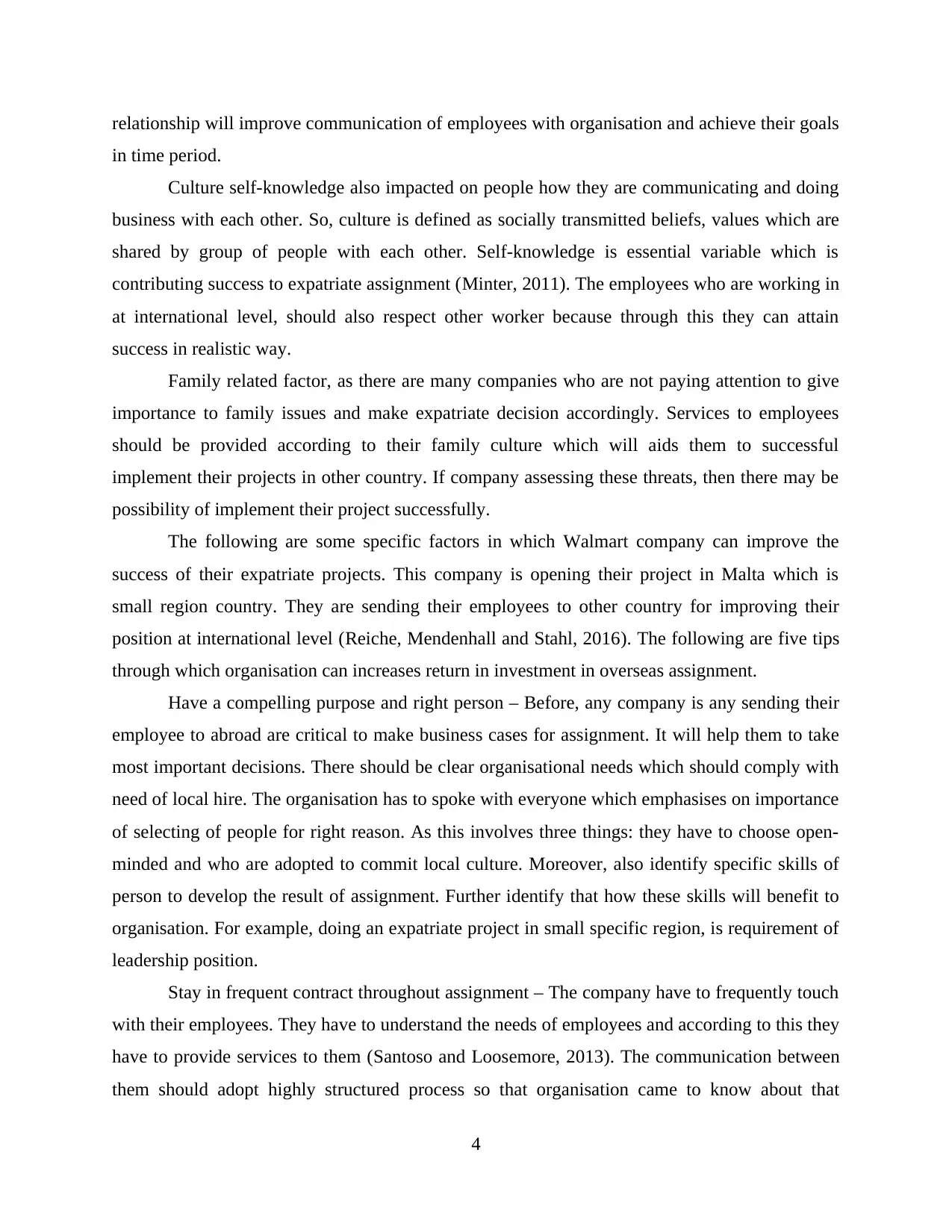
relationship will improve communication of employees with organisation and achieve their goals
in time period.
Culture self-knowledge also impacted on people how they are communicating and doing
business with each other. So, culture is defined as socially transmitted beliefs, values which are
shared by group of people with each other. Self-knowledge is essential variable which is
contributing success to expatriate assignment (Minter, 2011). The employees who are working in
at international level, should also respect other worker because through this they can attain
success in realistic way.
Family related factor, as there are many companies who are not paying attention to give
importance to family issues and make expatriate decision accordingly. Services to employees
should be provided according to their family culture which will aids them to successful
implement their projects in other country. If company assessing these threats, then there may be
possibility of implement their project successfully.
The following are some specific factors in which Walmart company can improve the
success of their expatriate projects. This company is opening their project in Malta which is
small region country. They are sending their employees to other country for improving their
position at international level (Reiche, Mendenhall and Stahl, 2016). The following are five tips
through which organisation can increases return in investment in overseas assignment.
Have a compelling purpose and right person – Before, any company is any sending their
employee to abroad are critical to make business cases for assignment. It will help them to take
most important decisions. There should be clear organisational needs which should comply with
need of local hire. The organisation has to spoke with everyone which emphasises on importance
of selecting of people for right reason. As this involves three things: they have to choose open-
minded and who are adopted to commit local culture. Moreover, also identify specific skills of
person to develop the result of assignment. Further identify that how these skills will benefit to
organisation. For example, doing an expatriate project in small specific region, is requirement of
leadership position.
Stay in frequent contract throughout assignment – The company have to frequently touch
with their employees. They have to understand the needs of employees and according to this they
have to provide services to them (Santoso and Loosemore, 2013). The communication between
them should adopt highly structured process so that organisation came to know about that
4
in time period.
Culture self-knowledge also impacted on people how they are communicating and doing
business with each other. So, culture is defined as socially transmitted beliefs, values which are
shared by group of people with each other. Self-knowledge is essential variable which is
contributing success to expatriate assignment (Minter, 2011). The employees who are working in
at international level, should also respect other worker because through this they can attain
success in realistic way.
Family related factor, as there are many companies who are not paying attention to give
importance to family issues and make expatriate decision accordingly. Services to employees
should be provided according to their family culture which will aids them to successful
implement their projects in other country. If company assessing these threats, then there may be
possibility of implement their project successfully.
The following are some specific factors in which Walmart company can improve the
success of their expatriate projects. This company is opening their project in Malta which is
small region country. They are sending their employees to other country for improving their
position at international level (Reiche, Mendenhall and Stahl, 2016). The following are five tips
through which organisation can increases return in investment in overseas assignment.
Have a compelling purpose and right person – Before, any company is any sending their
employee to abroad are critical to make business cases for assignment. It will help them to take
most important decisions. There should be clear organisational needs which should comply with
need of local hire. The organisation has to spoke with everyone which emphasises on importance
of selecting of people for right reason. As this involves three things: they have to choose open-
minded and who are adopted to commit local culture. Moreover, also identify specific skills of
person to develop the result of assignment. Further identify that how these skills will benefit to
organisation. For example, doing an expatriate project in small specific region, is requirement of
leadership position.
Stay in frequent contract throughout assignment – The company have to frequently touch
with their employees. They have to understand the needs of employees and according to this they
have to provide services to them (Santoso and Loosemore, 2013). The communication between
them should adopt highly structured process so that organisation came to know about that
4
⊘ This is a preview!⊘
Do you want full access?
Subscribe today to unlock all pages.

Trusted by 1+ million students worldwide
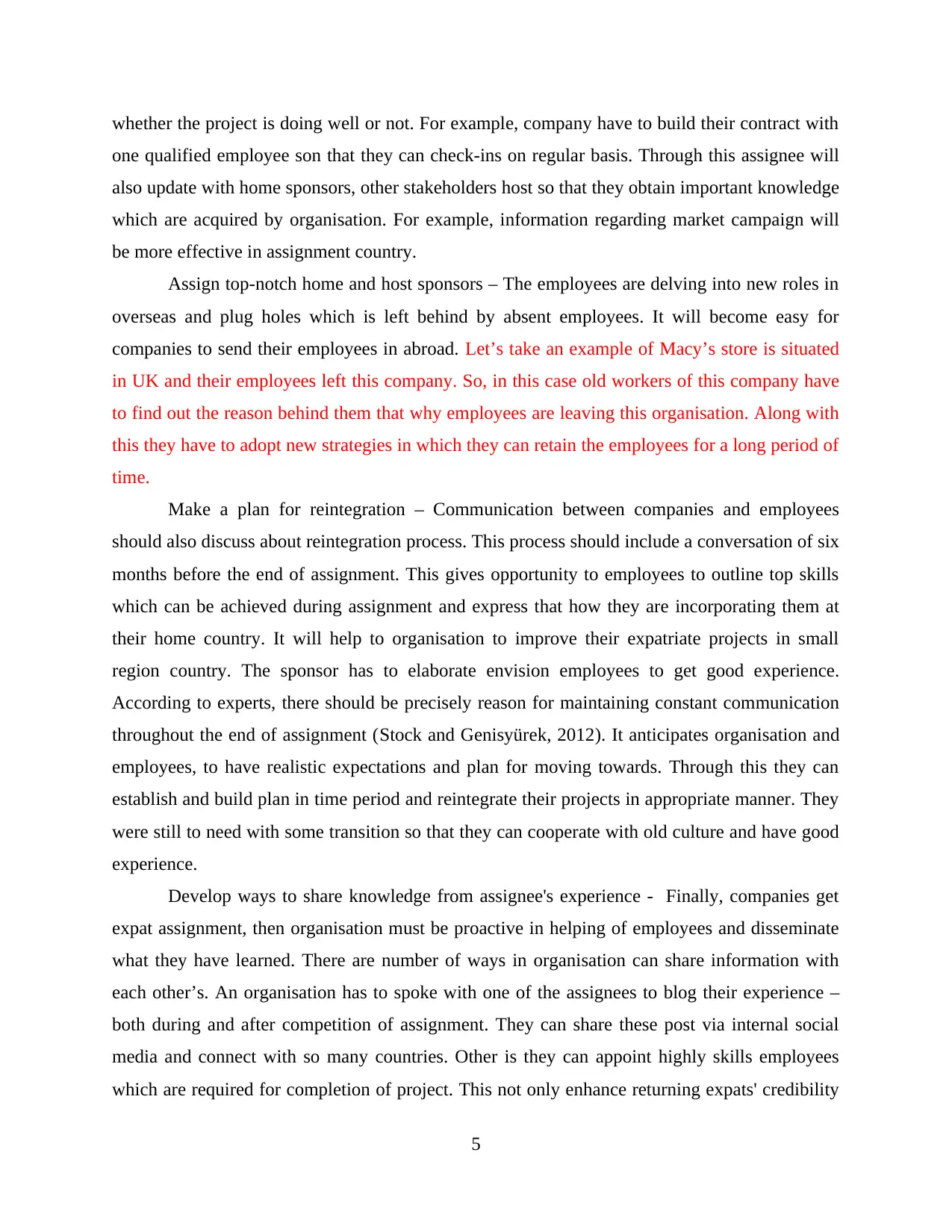
whether the project is doing well or not. For example, company have to build their contract with
one qualified employee son that they can check-ins on regular basis. Through this assignee will
also update with home sponsors, other stakeholders host so that they obtain important knowledge
which are acquired by organisation. For example, information regarding market campaign will
be more effective in assignment country.
Assign top-notch home and host sponsors – The employees are delving into new roles in
overseas and plug holes which is left behind by absent employees. It will become easy for
companies to send their employees in abroad. Let’s take an example of Macy’s store is situated
in UK and their employees left this company. So, in this case old workers of this company have
to find out the reason behind them that why employees are leaving this organisation. Along with
this they have to adopt new strategies in which they can retain the employees for a long period of
time.
Make a plan for reintegration – Communication between companies and employees
should also discuss about reintegration process. This process should include a conversation of six
months before the end of assignment. This gives opportunity to employees to outline top skills
which can be achieved during assignment and express that how they are incorporating them at
their home country. It will help to organisation to improve their expatriate projects in small
region country. The sponsor has to elaborate envision employees to get good experience.
According to experts, there should be precisely reason for maintaining constant communication
throughout the end of assignment (Stock and Genisyürek, 2012). It anticipates organisation and
employees, to have realistic expectations and plan for moving towards. Through this they can
establish and build plan in time period and reintegrate their projects in appropriate manner. They
were still to need with some transition so that they can cooperate with old culture and have good
experience.
Develop ways to share knowledge from assignee's experience - Finally, companies get
expat assignment, then organisation must be proactive in helping of employees and disseminate
what they have learned. There are number of ways in organisation can share information with
each other’s. An organisation has to spoke with one of the assignees to blog their experience –
both during and after competition of assignment. They can share these post via internal social
media and connect with so many countries. Other is they can appoint highly skills employees
which are required for completion of project. This not only enhance returning expats' credibility
5
one qualified employee son that they can check-ins on regular basis. Through this assignee will
also update with home sponsors, other stakeholders host so that they obtain important knowledge
which are acquired by organisation. For example, information regarding market campaign will
be more effective in assignment country.
Assign top-notch home and host sponsors – The employees are delving into new roles in
overseas and plug holes which is left behind by absent employees. It will become easy for
companies to send their employees in abroad. Let’s take an example of Macy’s store is situated
in UK and their employees left this company. So, in this case old workers of this company have
to find out the reason behind them that why employees are leaving this organisation. Along with
this they have to adopt new strategies in which they can retain the employees for a long period of
time.
Make a plan for reintegration – Communication between companies and employees
should also discuss about reintegration process. This process should include a conversation of six
months before the end of assignment. This gives opportunity to employees to outline top skills
which can be achieved during assignment and express that how they are incorporating them at
their home country. It will help to organisation to improve their expatriate projects in small
region country. The sponsor has to elaborate envision employees to get good experience.
According to experts, there should be precisely reason for maintaining constant communication
throughout the end of assignment (Stock and Genisyürek, 2012). It anticipates organisation and
employees, to have realistic expectations and plan for moving towards. Through this they can
establish and build plan in time period and reintegrate their projects in appropriate manner. They
were still to need with some transition so that they can cooperate with old culture and have good
experience.
Develop ways to share knowledge from assignee's experience - Finally, companies get
expat assignment, then organisation must be proactive in helping of employees and disseminate
what they have learned. There are number of ways in organisation can share information with
each other’s. An organisation has to spoke with one of the assignees to blog their experience –
both during and after competition of assignment. They can share these post via internal social
media and connect with so many countries. Other is they can appoint highly skills employees
which are required for completion of project. This not only enhance returning expats' credibility
5
Paraphrase This Document
Need a fresh take? Get an instant paraphrase of this document with our AI Paraphraser
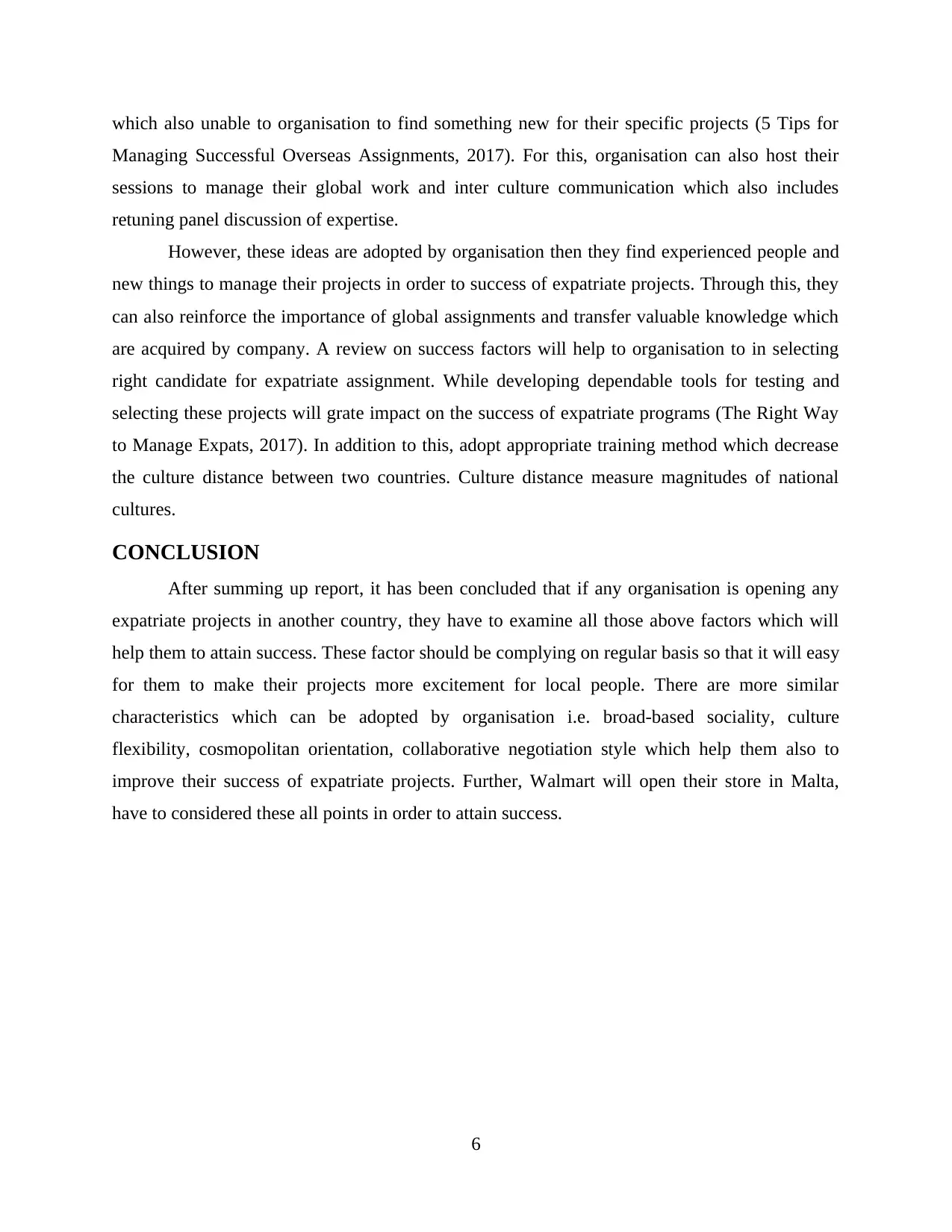
which also unable to organisation to find something new for their specific projects (5 Tips for
Managing Successful Overseas Assignments, 2017). For this, organisation can also host their
sessions to manage their global work and inter culture communication which also includes
retuning panel discussion of expertise.
However, these ideas are adopted by organisation then they find experienced people and
new things to manage their projects in order to success of expatriate projects. Through this, they
can also reinforce the importance of global assignments and transfer valuable knowledge which
are acquired by company. A review on success factors will help to organisation to in selecting
right candidate for expatriate assignment. While developing dependable tools for testing and
selecting these projects will grate impact on the success of expatriate programs (The Right Way
to Manage Expats, 2017). In addition to this, adopt appropriate training method which decrease
the culture distance between two countries. Culture distance measure magnitudes of national
cultures.
CONCLUSION
After summing up report, it has been concluded that if any organisation is opening any
expatriate projects in another country, they have to examine all those above factors which will
help them to attain success. These factor should be complying on regular basis so that it will easy
for them to make their projects more excitement for local people. There are more similar
characteristics which can be adopted by organisation i.e. broad-based sociality, culture
flexibility, cosmopolitan orientation, collaborative negotiation style which help them also to
improve their success of expatriate projects. Further, Walmart will open their store in Malta,
have to considered these all points in order to attain success.
6
Managing Successful Overseas Assignments, 2017). For this, organisation can also host their
sessions to manage their global work and inter culture communication which also includes
retuning panel discussion of expertise.
However, these ideas are adopted by organisation then they find experienced people and
new things to manage their projects in order to success of expatriate projects. Through this, they
can also reinforce the importance of global assignments and transfer valuable knowledge which
are acquired by company. A review on success factors will help to organisation to in selecting
right candidate for expatriate assignment. While developing dependable tools for testing and
selecting these projects will grate impact on the success of expatriate programs (The Right Way
to Manage Expats, 2017). In addition to this, adopt appropriate training method which decrease
the culture distance between two countries. Culture distance measure magnitudes of national
cultures.
CONCLUSION
After summing up report, it has been concluded that if any organisation is opening any
expatriate projects in another country, they have to examine all those above factors which will
help them to attain success. These factor should be complying on regular basis so that it will easy
for them to make their projects more excitement for local people. There are more similar
characteristics which can be adopted by organisation i.e. broad-based sociality, culture
flexibility, cosmopolitan orientation, collaborative negotiation style which help them also to
improve their success of expatriate projects. Further, Walmart will open their store in Malta,
have to considered these all points in order to attain success.
6
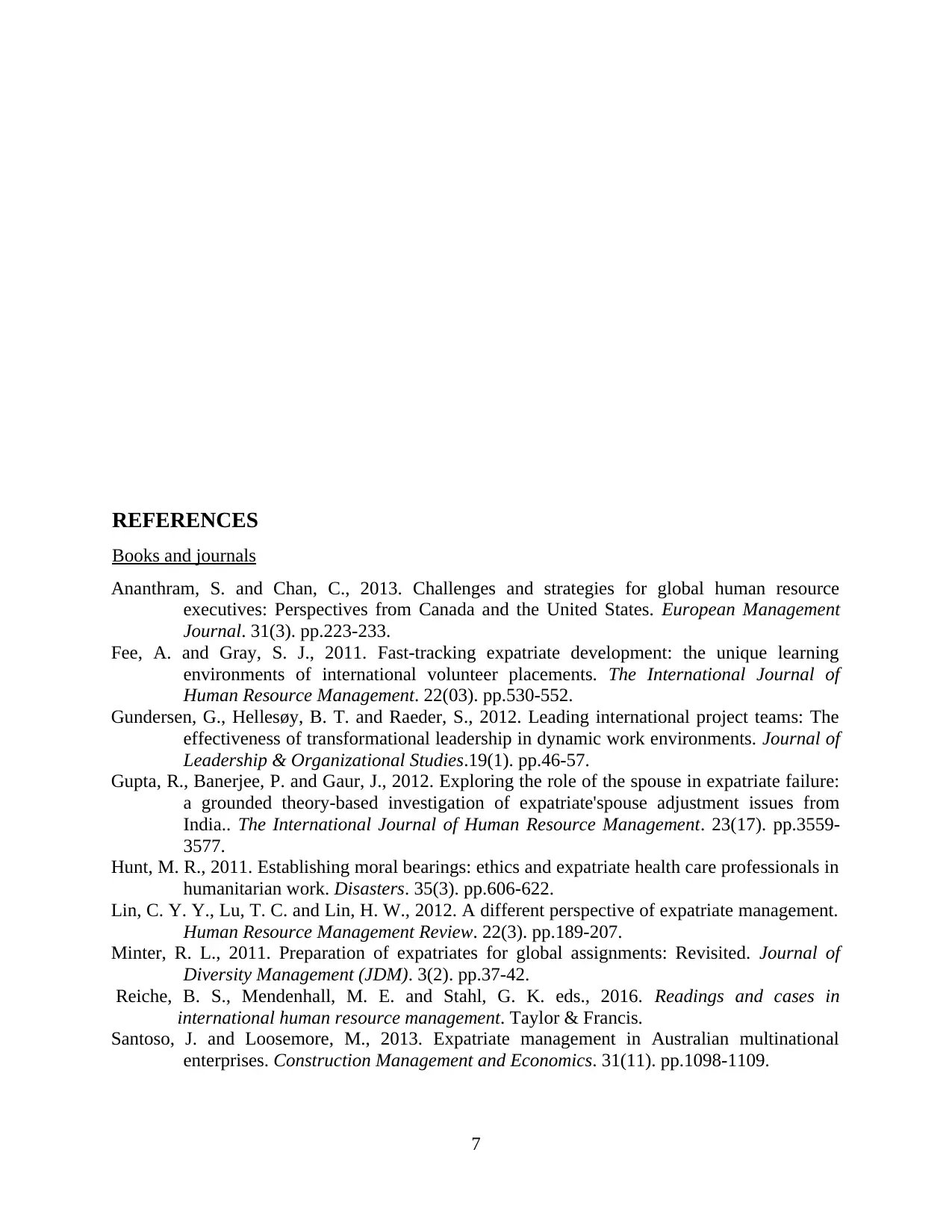
REFERENCES
Books and journals
Ananthram, S. and Chan, C., 2013. Challenges and strategies for global human resource
executives: Perspectives from Canada and the United States. European Management
Journal. 31(3). pp.223-233.
Fee, A. and Gray, S. J., 2011. Fast-tracking expatriate development: the unique learning
environments of international volunteer placements. The International Journal of
Human Resource Management. 22(03). pp.530-552.
Gundersen, G., Hellesøy, B. T. and Raeder, S., 2012. Leading international project teams: The
effectiveness of transformational leadership in dynamic work environments. Journal of
Leadership & Organizational Studies.19(1). pp.46-57.
Gupta, R., Banerjee, P. and Gaur, J., 2012. Exploring the role of the spouse in expatriate failure:
a grounded theory-based investigation of expatriate'spouse adjustment issues from
India.. The International Journal of Human Resource Management. 23(17). pp.3559-
3577.
Hunt, M. R., 2011. Establishing moral bearings: ethics and expatriate health care professionals in
humanitarian work. Disasters. 35(3). pp.606-622.
Lin, C. Y. Y., Lu, T. C. and Lin, H. W., 2012. A different perspective of expatriate management.
Human Resource Management Review. 22(3). pp.189-207.
Minter, R. L., 2011. Preparation of expatriates for global assignments: Revisited. Journal of
Diversity Management (JDM). 3(2). pp.37-42.
Reiche, B. S., Mendenhall, M. E. and Stahl, G. K. eds., 2016. Readings and cases in
international human resource management. Taylor & Francis.
Santoso, J. and Loosemore, M., 2013. Expatriate management in Australian multinational
enterprises. Construction Management and Economics. 31(11). pp.1098-1109.
7
Books and journals
Ananthram, S. and Chan, C., 2013. Challenges and strategies for global human resource
executives: Perspectives from Canada and the United States. European Management
Journal. 31(3). pp.223-233.
Fee, A. and Gray, S. J., 2011. Fast-tracking expatriate development: the unique learning
environments of international volunteer placements. The International Journal of
Human Resource Management. 22(03). pp.530-552.
Gundersen, G., Hellesøy, B. T. and Raeder, S., 2012. Leading international project teams: The
effectiveness of transformational leadership in dynamic work environments. Journal of
Leadership & Organizational Studies.19(1). pp.46-57.
Gupta, R., Banerjee, P. and Gaur, J., 2012. Exploring the role of the spouse in expatriate failure:
a grounded theory-based investigation of expatriate'spouse adjustment issues from
India.. The International Journal of Human Resource Management. 23(17). pp.3559-
3577.
Hunt, M. R., 2011. Establishing moral bearings: ethics and expatriate health care professionals in
humanitarian work. Disasters. 35(3). pp.606-622.
Lin, C. Y. Y., Lu, T. C. and Lin, H. W., 2012. A different perspective of expatriate management.
Human Resource Management Review. 22(3). pp.189-207.
Minter, R. L., 2011. Preparation of expatriates for global assignments: Revisited. Journal of
Diversity Management (JDM). 3(2). pp.37-42.
Reiche, B. S., Mendenhall, M. E. and Stahl, G. K. eds., 2016. Readings and cases in
international human resource management. Taylor & Francis.
Santoso, J. and Loosemore, M., 2013. Expatriate management in Australian multinational
enterprises. Construction Management and Economics. 31(11). pp.1098-1109.
7
⊘ This is a preview!⊘
Do you want full access?
Subscribe today to unlock all pages.

Trusted by 1+ million students worldwide
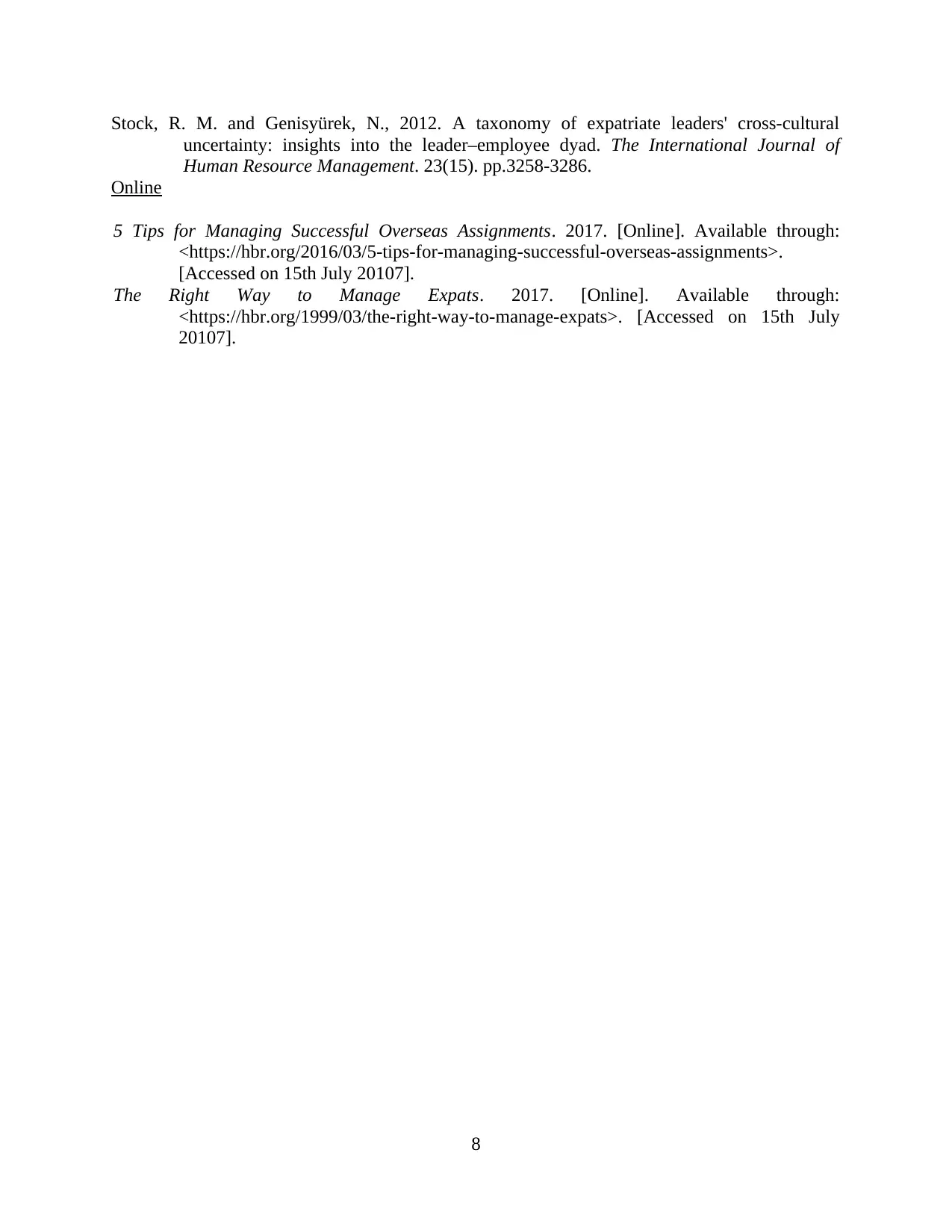
Stock, R. M. and Genisyürek, N., 2012. A taxonomy of expatriate leaders' cross-cultural
uncertainty: insights into the leader–employee dyad. The International Journal of
Human Resource Management. 23(15). pp.3258-3286.
Online
5 Tips for Managing Successful Overseas Assignments. 2017. [Online]. Available through:
<https://hbr.org/2016/03/5-tips-for-managing-successful-overseas-assignments>.
[Accessed on 15th July 20107].
The Right Way to Manage Expats. 2017. [Online]. Available through:
<https://hbr.org/1999/03/the-right-way-to-manage-expats>. [Accessed on 15th July
20107].
8
uncertainty: insights into the leader–employee dyad. The International Journal of
Human Resource Management. 23(15). pp.3258-3286.
Online
5 Tips for Managing Successful Overseas Assignments. 2017. [Online]. Available through:
<https://hbr.org/2016/03/5-tips-for-managing-successful-overseas-assignments>.
[Accessed on 15th July 20107].
The Right Way to Manage Expats. 2017. [Online]. Available through:
<https://hbr.org/1999/03/the-right-way-to-manage-expats>. [Accessed on 15th July
20107].
8
1 out of 10
Related Documents
Your All-in-One AI-Powered Toolkit for Academic Success.
+13062052269
info@desklib.com
Available 24*7 on WhatsApp / Email
![[object Object]](/_next/static/media/star-bottom.7253800d.svg)
Unlock your academic potential
Copyright © 2020–2025 A2Z Services. All Rights Reserved. Developed and managed by ZUCOL.





